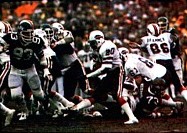| 1981 Buffalo Bills season | |
|---|---|
| Owner | Ralph Wilson |
| Head coach | Chuck Knox |
| Home stadium | Rich Stadium |
| Results | |
| Record | 10–6 |
| Division place | 3rd AFC East |
| Playoffs | Won Wild Card Playoffs (at Jets) 31–27 Lost Divisional Playoffs (at Bengals) 21–28 |
| Pro Bowlers | RB Joe Cribbs WR Frank Lewis DT Fred Smerlas |

The 1981 Buffalo Bills season was the franchise's 12th season in the National Football League, and the 22nd overall.
Contents
- Offseason
- NFL draft
- Personnel
- Staff/coaches
- Roster
- Regular season
- Schedule
- Standings
- Game summaries
- Playoffs
- Wild card
- Divisional
- Awards and honors
- All-Pros
- References
The season's most memorable moment was probably a Hail Mary catch against the New England Patriots in Week Twelve. [1] The 36-yard touchdown pass from Bills quarterback Joe Ferguson to running back Roland Hooks as time expired won the game for Buffalo, 20–17. [2] The win proved to be crucial in giving Buffalo the final playoff spot in the AFC in 1981. [3] The Bills qualified for the playoffs defeating their division rival New York Jets, 31–27 in the Wild Card game. But lost 28–21 to the Cincinnati Bengals in the Divisional playoffs.